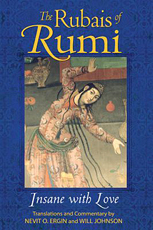Jellaludin Rumi left us with more than 1700 rubais, which he spontaneously composed. In the introduction to this collection, Will Johnson (Rumi: Gazing at the Beloved) states that rubais can be considered a Persian form of Japanese haiku: short and pithy aphorisms about life. (Another famous collection of rubais, dating from the eleventh century, is The Rubaiyat of Omar Khayyam.) Johnson spells out in detail the themes found in Rumi's poetry including separation and union, existence and absence, annihilation, ecstasy and intoxication, the friend, the beloved, the lover, the cupbearer, and sema (listening, also the whirling dervish dance). For this Persian seer and mystic, the practices of movement, gazing, fasting, and breathing provided pathways to the Divine.
Nevit O. Ergin is the original English translator of the 44,000 verses that appear in the 23-volume collection by Rumi called the Divan-I Kabir. He has translated the 233 rubais which appear in this paperback. Here are three examples:
"I made an oath to myself:
as long as I live
as long as my soul remains in this body
I won't deviate from the right way
but later I looked to my left and then to
my right
and I saw our beloved everywhere
how could I make a wrong turn?
"if your hands get tired serving the beloved
then use your feet
if your feet get tired
then yell and scream
if you lose your voice
then use your head
in other words, show your faith in every breath
you take"
"the one who's peaceful and happy
isn't attached to wealth or poverty
less or more
he cares neither for the world
for people
nor even for himself
he's gone beyond
and has left no trace behind"
